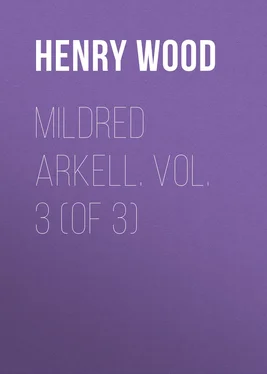Henry Wood - Mildred Arkell. Vol. 3 (of 3)
Здесь есть возможность читать онлайн «Henry Wood - Mildred Arkell. Vol. 3 (of 3)» — ознакомительный отрывок электронной книги совершенно бесплатно, а после прочтения отрывка купить полную версию. В некоторых случаях можно слушать аудио, скачать через торрент в формате fb2 и присутствует краткое содержание. Жанр: foreign_sf, literature_19, foreign_antique, foreign_prose, на английском языке. Описание произведения, (предисловие) а так же отзывы посетителей доступны на портале библиотеки ЛибКат.
- Название:Mildred Arkell. Vol. 3 (of 3)
- Автор:
- Жанр:
- Год:неизвестен
- ISBN:нет данных
- Рейтинг книги:5 / 5. Голосов: 1
-
Избранное:Добавить в избранное
- Отзывы:
-
Ваша оценка:
- 100
- 1
- 2
- 3
- 4
- 5
Mildred Arkell. Vol. 3 (of 3): краткое содержание, описание и аннотация
Предлагаем к чтению аннотацию, описание, краткое содержание или предисловие (зависит от того, что написал сам автор книги «Mildred Arkell. Vol. 3 (of 3)»). Если вы не нашли необходимую информацию о книге — напишите в комментариях, мы постараемся отыскать её.
Mildred Arkell. Vol. 3 (of 3) — читать онлайн ознакомительный отрывок
Ниже представлен текст книги, разбитый по страницам. Система сохранения места последней прочитанной страницы, позволяет с удобством читать онлайн бесплатно книгу «Mildred Arkell. Vol. 3 (of 3)», без необходимости каждый раз заново искать на чём Вы остановились. Поставьте закладку, и сможете в любой момент перейти на страницу, на которой закончили чтение.
Интервал:
Закладка:
It very much augmented his ill feeling, especially when he remembered his own night of horrible anticipation. Mr. Lewis had come to the final conclusion that Arkell had been "out on the spree;" and but for a vague fear that his own share in the night's events might be dragged to light, he would certainly have contrived that it should reach the ears of Mr. Wilberforce. He and his brother were to be for another half year boarders at the master's house. Cookesley acted there as senior; the senior boy, Prattleton, living at home.
The boys trooped into the schoolroom, and Prattleton stood with the roll in his hand. Lewis had not joined on the previous day; he had obtained grace until this, for he wanted to spend it at Eckford. As he came in now, he made rather a parade of shaking hands with Prattleton, and wishing him joy of his honours. Most of the boys liked to begin by being in favour with a new senior, however they might be fated to end, and Lewis and Prattleton were great personal friends—it may be said confidants. Lewis had partially trusted Prattleton with the secret of his love for Miss Beauclerc; and he had fully entrusted him with his hatred of Henry Arkell. Scarcely a minute were they together at any time, but Lewis was speaking against Arkell; telling this against him, telling that. Constant dropping will wear away a stone; and Prattleton listened until he was in a degree imbued with the same feeling. Personally, he had no dislike to Arkell himself; but, incited by Lewis, he was quite willing to do him any ill turn privately.
The roll was called over when Henry Arkell entered. He put down a load of books he carried, and went up to Prattleton to shake hands, as Lewis had done; being a chorister, he had not gone into the schoolroom on the previous day; and he wished him all good luck.
"I am sorry to have to mark you late on the first morning, Arkell," Prattleton quietly said as he shook hands with him. "The school has a superstition, you know—that anyone late on the first morning will be so, as a rule, through the half."
"I know," answered Henry. "It is no fault of mine. Mr. Wilberforce desired me to tell you that he detained me, therefore I am to be marked as having been present."
"Did he detain you?"
"For ten minutes at least. I met him as I was coming in, and he caused me to go back with him to his house and bring in these books. He then gave me the message to you."
"All right," said Prattleton, cheerfully: and he erased the cross against Arkell's name, and marked him as present.
Even this little incident exasperated Lewis. His ill feeling rendered him unjust. No other boy, that he could remember, had been marked as present, not being so. He was beginning to say something sarcastic upon the point, when the entrance of the master himself shut up his tongue for the present.
But we cannot stop with the college boys just now.
On this same day, later, when the sun, had there been any sun to see, was nearing the meridian, Lawyer Fauntleroy sat in his private office, deep in business. Not a more clever lawyer than he throughout the town of Westerbury; and to such men business flocks in. His table stood at a right angle with the fireplace, and the blazing fire burning there, threw its heat upon his face, and his feet rested on a soft thick mat of wool. Mr. Fauntleroy, no longer young, was growing fonder and fonder of the comforts of life, and he sat there cosily, heedless of the hail that beat on the window without.
The door softly opened, and a clerk came in. It was Kenneth. "Are you at home, sir?"
Mr. Fauntleroy glanced up from the parchment he was bending over—a yellow-looking deed, and his brow looked forth displeasure. "I told you I did not care to be interrupted this morning, Kenneth, unless it was for anything very particular. Who is it?"
"A lady, sir. 'Mrs. Carr' was the name she gave in."
"Carr—Carr?" debated Mr. Fauntleroy, unable to recal any lady of the name amidst his acquaintance. "No. I have no leisure for ladies to-day."
Kenneth hesitated. "It's not likely to be the Mrs. Carr in Carr v. Carr; the lady you have had some correspondence with, is it, sir?" he waited to ask. "She is a stranger, and is dressed as a widow."
"The Mrs. Carr in Carr v. Carr!" repeated Mr. Fauntleroy. "By Jupiter, I shouldn't wonder if she's come to Westerbury! But I thought she was in Holland. Show her in."
Mr. Kenneth retired, and came back with the visitor. It was Mrs. Carr. Mr. Fauntleroy pushed aside the deed before him, and rose to salute her, wondering at her extreme youth. She spoke English fluently, but with a foreign accent, and she entered at once upon the matter which had brought her to Westerbury.
"A circumstance has occurred to renew the old anxiety about this cause," she said to Mr. Fauntleroy. "Should we lose it, I shall lose all I have at present to look forward to, for our affairs in Holland are more complicated than ever. It may turn out, Mr. Fauntleroy, that my share of this inheritance will be all I and my little children will have to depend upon in the world."
"But the cause is safe," returned Mr. Fauntleroy. "The paper you found and forwarded to me last October—or stay, November, wasn't it–"
"Would you be so kind as let me see that paper?" she interrupted.
Mr. Fauntleroy rose and brought forward a bundle of papers labelled "Carr." He drew out a letter, and laid it open before his visitor. It was the one you saw before; the letter written by Robert Carr the elder to his son, stating that the marriage had been solemnized at the church of St. James the Less, and that the entry of it would be found there.
"And there the marriage is entered, as I subsequently wrote you word," observed Mr. Fauntleroy. "It is singular how your husband could have overlooked that letter."
"It had slipped between the leaves of the blotting-book, or else been placed there purposely by Mr. Carr," she answered; "and my husband may not have been very particular in examining the desk, for at that time he did not know his legitimacy would be disputed. Are you sure it is in the register, sir?" she continued, some anxiety in her tone.
"Quite sure," replied Mr. Fauntleroy. "I sent to St. James's to search as soon as I got this letter, glad enough to have the clue at last; and there it was found."
"Well—it is very strange," observed Mrs. Carr, after a pause. "I will tell you what it is that has made me so anxious and brought me down. But, in the first place, I must observe that I concluded the cause was at an end. I cannot understand why the other side did not at once give up when that letter was discovered."
Knowing that he had kept the other side in ignorance of the letter, Mr. Fauntleroy was not very explanatory on this point. Mrs. Carr continued—
"My husband had a friend of the name of Littelby, a solicitor. He was formerly the manager of an office in London, but about two months since he left it for one in the country, Mynn and Mynn's–"
"Mynn and Mynn," interrupted Mr. Fauntleroy; "that's the firm who are conducting the case for your adversaries—the Carrs, of Eckford. Littelby? Yes, it is the name of their new man, I remember."
"Well, sir, last week Mr. Littelby was in London, and he called at Mrs. Dundyke's, where I had been staying since I came over from Holland, a fortnight before. The strangest thing has happened there! Mr. Dundyke—but you will not thank me to take up your time, perhaps, with matters that don't concern you. Mr. Littelby spoke to me upon the subject of the letter that I had found, and he said he feared there was something wrong about it, though he could not conceive how, for that there had been no marriage, so far as could be discovered."
"He can say the moon's made of green cheese if he likes," cried Mr. Fauntleroy.
"He said that the opinion of Mynn and Mynn was, that the pretended letter had been intended as a ruse —a false plea, written to induce the other side to give up peaceably; but that most positively there was no truth in the statement of the marriage being in the register. Sir, I am sure Mr. Littelby must have had good cause for saying this," emphatically continued Mrs. Carr "He is a man incapable of deceit, and he wishes well to me and my children. The last advice he gave me was, not to be sanguine; for Mynn and Mynn were clever and cautious practitioners, and he knew they made sure the cause was theirs."
Читать дальшеИнтервал:
Закладка:
Похожие книги на «Mildred Arkell. Vol. 3 (of 3)»
Представляем Вашему вниманию похожие книги на «Mildred Arkell. Vol. 3 (of 3)» списком для выбора. Мы отобрали схожую по названию и смыслу литературу в надежде предоставить читателям больше вариантов отыскать новые, интересные, ещё непрочитанные произведения.
Обсуждение, отзывы о книге «Mildred Arkell. Vol. 3 (of 3)» и просто собственные мнения читателей. Оставьте ваши комментарии, напишите, что Вы думаете о произведении, его смысле или главных героях. Укажите что конкретно понравилось, а что нет, и почему Вы так считаете.












